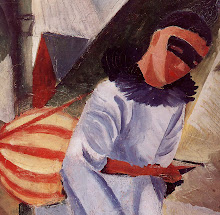What a story! (If you dig this sort of thing, of course.) Yet the Online Etymology Dictionary has a different take:
umbrella
1609, first attested in Donne's letters, from It. ombrello, from L.L. umbrella, altered (by influence of umbra) from L. umbella "sunshade, parasol," dim. of umbra "shade, shadow" (see umbrage).
Spoilsports. So the roots of "umbrella" lie in the Latin word for parasol, "umbella," itself meaning "little shade."
Furthermore, if the Kernerman English Multilingual Dictionary is to be trusted, a partly Germanic origin to the term would make English a minority amongst the other Germanic languages, virtually all of which use words of distinctly latinate origin:
Danish: paraply
Dutch: paraplu
English: umbrella
German: Schirm
Norwegian: paraply
Swedish: paraply
Compare the Romance languages:
French: parapluie
Italian: ombrello
Portuguese: guarda-chuva
Romanian: umbrelă
Spanish: paraguas
Still, Sasha Volokh's ratiocination naturally invites the question: can't we find some way to bring back umbeclap and umbelap? Given recent blogger fascination with verbal prefixes of Germanic origin, I would say the time is right. My offerings:
- Observers have said Mr. Giuliani’s reception at CPAC would be an early indication of whether the party’s more conservative elements would umbeclap him as the party’s standard-bearer.
- Umbelapped by cameras and supporters, Romney also wandered past a section the American Conservative Union, the group’s sponsor, had set up for bloggers.
Hey, they're not too bad!
Note: Sasha is obviously joking. (Or not so obviously.) Anyway, sometimes it's fun to invent etymologies for stuff. Who's with me on that? Anyone?

No comments:
Post a Comment